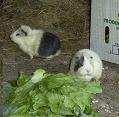|
 Home Home
 What's New? What's New?
 Definition Definition
 Our Design Our Design
 Techniques Techniques
 Articles Articles
 Blog Blog
 About Us About Us
 Year Planner Year Planner
 Resources Resources
 Links Links

Like us on
FaceBook!

Link to this site
|
|
Gardening for the Disabled
Many able-bodied folk don't consider the needs of the disabled when designing our gardens, yet all of know someone with special needs that would find it difficult to enjoy our wonderful gardens in the way that we take granted every day. It's not hard to consider some simple design elements that make gardens accessible and enjoyable for all while planning and building our gardens. It's good to know too, that whatever happens in the future (and we're all going to get old and rickety one day!) our gardens can sustain that wonderful sense of enjoyment we derive from them.
Here are some ideas to consider for designing gardens suitable for disabled access:
- Design to avoid unnecessary work
- Use mulch
- Recycle compostable materials
- Work with natural forces such as sun/shade, rain (watering plants), wind (distributing mulching material - leaves) and gravity, (positioning heavy elements uphill from where they are needed)
- Employ light easily moved containers.
- Use light potting mix and soil substitutes (e.g. Coconut coir and mushroom compost, leaves)
- Create no-dig beds and minimise need for digging and weeding
- No-bend gardens
- Use planters of light material or readily available material. Large planters are easier to maintain as they hold more moisture and can have mixed plantings which are less susceptible to insect invasion.
- Hanging gardens are suitable for trailling and shallow rooted edibles.
- Consider indoor gardens in sunny moist areas such as Bathrooms and Kitchens.
- Remember the high value of sprouts.
- Potted gardens on table tops at wheelchair height
- Lightweight tray gardens that can be moved easily
- Aquaculture gardens
- Terariums
- Miniature plants
- Aerial plants; bromeliads; orchids; epiphiliums (edible fruit)
- Medicinal succulents (such as varieties of Aloe)
- Edible flowers
I'm looking for more practical ideas to add to this page and would love your suggestion. I'll post them here - please send them.
|
|

Our ever-changing view!
Moonset ~ Roll Cloud ~ Sunset
|
permaculture ethics |
care for earth,
care for people,
return surplus,
reduce consumption |
 |
|
Recently Added Pages
Hot Links!

Bookworm is currently reading...
This site is sponsored by
ALWAYS LEARNING BOOKS
Publishers of Australian
books on Home Education.
  The Educating Parent The Educating Parent
  Beverley's other websites Beverley's other websites
|





